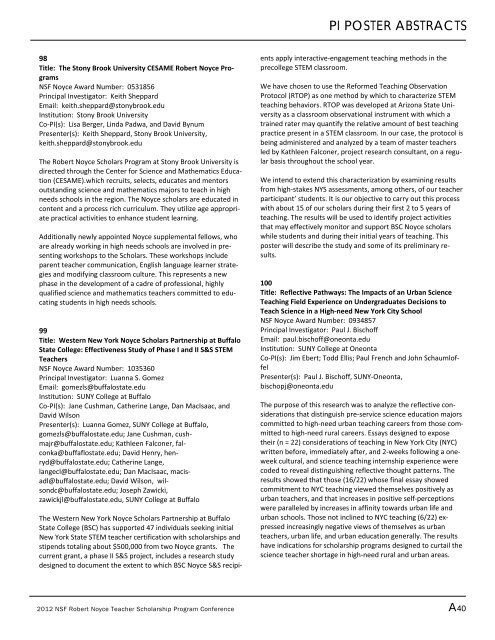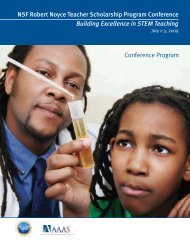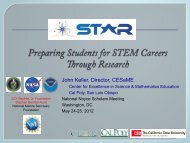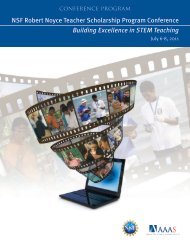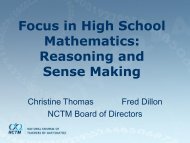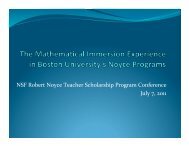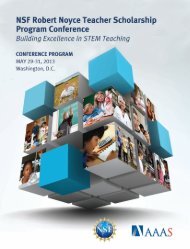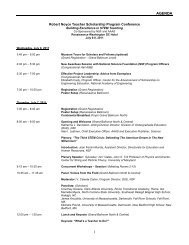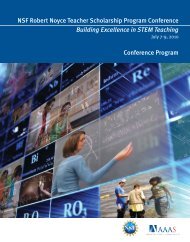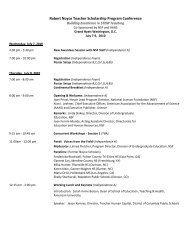PI POSTER ABSTRACTS95Title: <strong>The</strong> <strong>Noyce</strong> <strong>Program</strong> at Saint Joseph's UniversityNSF <strong>Noyce</strong> Award Number: 0934713Principal Investigator: Sandra FillebrownEmail: tberezov@sju.eduInstitution: St. Joseph's UniversityCo‐PI(s): Tetyana Berezovski, Karen Snetselaar, Michael Clapper,Michael McCann.Presenter(s): Tetyana Berezovski, St. Joseph's University, tberezov@sju.edu<strong>The</strong> <strong>Noyce</strong> <strong>Program</strong> at Saint Joseph's University has three majorcomponents. First, freshmen and sophomore math and sciencemajors can apply for our 6 week summer internship program.<strong>The</strong> third cohort of <strong>Noyce</strong> Interns are working with two charterschools in Philadelphia: Philadelphia Electric and TechnologyCharter High School and Maritime Academy Charter High School.<strong>The</strong> <strong>Noyce</strong> interns work with teachers providing summer enrichmentactivities in math and science. Second, students enrollingin our 5‐year BS/MS programs in math and science education areeligible for scholarships during their senior and fifth year. Wecurrently have 7 scholars at various points in their program. Andthird, students are supported in their beginning teaching careersthrough the Urban Teacher Collaborative. <strong>The</strong>se monthly meetingsare led by Michael Clapper, and discussions focus on variousissues of importance to the teachers.96Title: Preparing Teacher Leaders in MathematicsNSF <strong>Noyce</strong> Award Number: 0934878Principal Investigator: Kimberly ChildsEmail: beverlyll@sfasu.eduInstitution: Stephen F. Austin State UniversityCo‐PI(s): Lesa Beverly, Deborah Pace, and Betty AlfordPresenter(s): Lesa Beverly, Stephen F. Austin State University,beverlyll@sfasu.edu<strong>The</strong> Texas Leadership Initiative: Mathematics Instruction Transformed(Texas LIMIT) project is focused on the development ofmathematics teacher leaders in rural East Texas. Nearly allschool districts surrounding Stephen F. Austin State Universityare high needs districts and professional development opportunitiesfor teachers in these districts are limited as a result of locationand financial constraints. <strong>The</strong> Texas LIMIT project is providingan opportunity for these districts to have their masterteaching fellows receive training in leadership and coaching aswell as in the design and delivery of professional development inmathematics. This poster provides examples of the methodologiesused to accomplish this goal.97Title: Helping STEM Majors 'Test the Water' with TeachingNSF <strong>Noyce</strong> Award Number: 1136416Principal Investigator: Lesa BeverlyEmail: hubbardke@sfasu.eduInstitution: Stephen F. Austin State UniversityCo‐PI(s): Keith Hubbard, Dennis Gravatt, and Karen Embry‐JenlinkPresenter(s): Keith Hubbard, Stephen F. Austin State University,hubbardke@sfasu.eduIn our first year, Talented Teachers in Training for Texas (T4) setout to expand awareness of science and mathematics teachingthroughout the classic STEM pipeline, and at the same time attemptto hook high school students into the STEM pipeline. Ourstrategy was to actively recruit college freshmen and sophomoresto participate in three short term “feeder activities”. <strong>The</strong>first activity was a STEM day bringing roughly 250 high schoolfreshmen, sophomores, and juniors to campus to do activitiesand hear talks about exciting areas in STEM. We recruitedroughly 80 college students as co‐presenters and campus guides.<strong>The</strong> goal was not only to welcome and present STEM possibilitiesto high school students, but to give college students a chance tointeract with high school STEM teachers and students. We alsorecruited them heavily for other T4 activities.Our second recruiting activity was a week long‐job shadow witha <strong>Noyce</strong> trained master math or science teacher. <strong>The</strong> collegestudents had to apply for this program, but were given a stipendfor their work, then asked to attend a debriefing session onprocessing what it would look like to be a teacher. Our thirdrecruiting activity was a 5‐day NASA summer experience wherecollege students are teamed with a NASA engineer, a certifiedmath or science teacher, and ten high school students to plan amission at NASA’s Clear Lake facility. Both of these programsrequired slightly more commitment and screening than STEMDay participation. We had 35 students apply for programs withmore commitment, however, all program activities ultimatelyserve to feed the <strong>Noyce</strong> scholarship program..In the first year, the main challenge was to publicize our recruitingevents and get students to signing up. We designed a website(t4.sfasu.edu), created fliers, held an information night, andplanned great events, but really it was reaching out to STEMmajors in the classroom that proved most effective. Gettingfaculty buy‐in was key. Our single most effective approach washaving a student’s instructor call them aside and suggest theprogram to them. <strong>The</strong> next most effective approach was our 16classroom presentations (which also depended on faculty invitingus in). Our poster will focus most specifically on our strategyfor recruiting, replete with setbacks and successes from the firstyear.A39<strong>2012</strong> NSF <strong>Robert</strong> <strong>Noyce</strong> Teacher <strong>Scholarship</strong> <strong>Program</strong> <strong>Conference</strong>
PI POSTER ABSTRACTS98Title: <strong>The</strong> Stony Brook University CESAME <strong>Robert</strong> <strong>Noyce</strong> <strong>Program</strong>sNSF <strong>Noyce</strong> Award Number: 0531856Principal Investigator: Keith SheppardEmail: keith.sheppard@stonybrook.eduInstitution: Stony Brook UniversityCo‐PI(s): Lisa Berger, Linda Padwa, and David BynumPresenter(s): Keith Sheppard, Stony Brook University,keith.sheppard@stonybrook.edu<strong>The</strong> <strong>Robert</strong> <strong>Noyce</strong> Scholars <strong>Program</strong> at Stony Brook University isdirected through the Center for Science and Mathematics Education(CESAME).which recruits, selects, educates and mentorsoutstanding science and mathematics majors to teach in highneeds schools in the region. <strong>The</strong> <strong>Noyce</strong> scholars are educated incontent and a process rich curriculum. <strong>The</strong>y utilize age appropriatepractical activities to enhance student learning.Additionally newly appointed <strong>Noyce</strong> supplemental fellows, whoare already working in high needs schools are involved in presentingworkshops to the Scholars. <strong>The</strong>se workshops includeparent teacher communication, English language learner strategiesand modifying classroom culture. This represents a newphase in the development of a cadre of professional, highlyqualified science and mathematics teachers committed to educatingstudents in high needs schools.99Title: Western New York <strong>Noyce</strong> Scholars Partnership at BuffaloState College: Effectiveness Study of Phase I and II S&S STEMTeachersNSF <strong>Noyce</strong> Award Number: 1035360Principal Investigator: Luanna S. GomezEmail: gomezls@buffalostate.eduInstitution: SUNY College at BuffaloCo‐PI(s): Jane Cushman, Catherine Lange, Dan MacIsaac, andDavid WilsonPresenter(s): Luanna Gomez, SUNY College at Buffalo,gomezls@buffalostate.edu; Jane Cushman, cushmajr@buffalostate.edu;Kathleen Falconer, falconka@buffaflostate.edu;David Henry, henryd@buffalostate.edu;Catherine Lange,langecl@buffalostate.edu; Dan MacIsaac, macisadl@buffalostate.edu;David Wilson, wilsondc@buffalostate.edu;Joseph Zawicki,zawickjl@buffalostate.edu, SUNY College at Buffalo<strong>The</strong> Western New York <strong>Noyce</strong> Scholars Partnership at BuffaloState College (BSC) has supported 47 individuals seeking initialNew York State STEM teacher certification with scholarships andstipends totaling about $500,000 from two <strong>Noyce</strong> grants. <strong>The</strong>current grant, a phase II S&S project, includes a research studydesigned to document the extent to which BSC <strong>Noyce</strong> S&S recipientsapply interactive‐engagement teaching methods in theprecollege STEM classroom.We have chosen to use the Reformed Teaching ObservationProtocol (RTOP) as one method by which to characterize STEMteaching behaviors. RTOP was developed at Arizona State Universityas a classroom observational instrument with which atrained rater may quantify the relative amount of best teachingpractice present in a STEM classroom. In our case, the protocol isbeing administered and analyzed by a team of master teachersled by Kathleen Falconer, project research consultant, on a regularbasis throughout the school year.We intend to extend this characterization by examining resultsfrom high‐stakes NYS assessments, among others, of our teacherparticipant’ students. It is our objective to carry out this processwith about 15 of our scholars during their first 2 to 5 years ofteaching. <strong>The</strong> results will be used to identify project activitiesthat may effectively monitor and support BSC <strong>Noyce</strong> scholarswhile students and during their initial years of teaching. Thisposter will describe the study and some of its preliminary results.100Title: Reflective Pathways: <strong>The</strong> Impacts of an Urban ScienceTeaching Field Experience on Undergraduates Decisions toTeach Science in a High‐need New York City SchoolNSF <strong>Noyce</strong> Award Number: 0934857Principal Investigator: Paul J. BischoffEmail: paul.bischoff@oneonta.eduInstitution: SUNY College at OneontaCo‐PI(s): Jim Ebert; Todd Ellis; Paul French and John SchaumloffelPresenter(s): Paul J. Bischoff, SUNY‐Oneonta,bischopj@oneonta.edu<strong>The</strong> purpose of this research was to analyze the reflective considerationsthat distinguish pre‐service science education majorscommitted to high‐need urban teaching careers from those committedto high‐need rural careers. Essays designed to exposetheir (n = 22) considerations of teaching in New York City (NYC)written before, immediately after, and 2‐weeks following a oneweekcultural, and science teaching internship experience werecoded to reveal distinguishing reflective thought patterns. <strong>The</strong>results showed that those (16/22) whose final essay showedcommitment to NYC teaching viewed themselves positively asurban teachers, and that increases in positive self‐perceptionswere paralleled by increases in affinity towards urban life andurban schools. Those not inclined to NYC teaching (6/22) expressedincreasingly negative views of themselves as urbanteachers, urban life, and urban education generally. <strong>The</strong> resultshave indications for scholarship programs designed to curtail thescience teacher shortage in high‐need rural and urban areas.<strong>2012</strong> NSF <strong>Robert</strong> <strong>Noyce</strong> Teacher <strong>Scholarship</strong> <strong>Program</strong> <strong>Conference</strong>A40
- Page 1 and 2:
NSF Robert Noyce Teacher Scholarshi
- Page 3 and 4:
NSF Robert Noyce Teacher Scholarshi
- Page 5 and 6:
CONTENTSAbout the NSF Robert Noyce
- Page 7 and 8:
AGENDAWEDNESDAY, MAY 23, 20123:30 p
- Page 9 and 10:
HOTEL FLOOR PLANS2012 NSF Robert No
- Page 11 and 12:
SPEAKER BIOGRAPHIESL’Oreal USA an
- Page 14 and 15:
WORKSHOP ABSTRACTSSession I: Thursd
- Page 16 and 17:
WORKSHOP ABSTRACTSTarget Audience:
- Page 18 and 19:
WORKSHOP ABSTRACTS1.8 Preparing Noy
- Page 20 and 21:
WORKSHOP ABSTRACTStutorials for usi
- Page 22 and 23:
WORKSHOP ABSTRACTSentation, three o
- Page 24 and 25:
WORKSHOP ABSTRACTS2.9 Science NetLi
- Page 26 and 27: WORKSHOP ABSTRACTS2.14 Understandin
- Page 31 and 32: WORKSHOP ABSTRACTSThis session will
- Page 33: WORKSHOP ABSTRACTSColleges for Teac
- Page 36 and 37: WORKSHOP ABSTRACTSlesson and will p
- Page 38 and 39: PI POSTER ABSTRACTS1Title: Teachers
- Page 40 and 41: PI POSTER ABSTRACTSJulie A. Luft, A
- Page 42 and 43: PI POSTER ABSTRACTSClinical experie
- Page 44 and 45: PI POSTER ABSTRACTSon topics includ
- Page 46 and 47: PI POSTER ABSTRACTSof the group at
- Page 48 and 49: PI POSTER ABSTRACTSopportunities. E
- Page 50 and 51: PI POSTER ABSTRACTS3. Partnership w
- Page 52 and 53: PI POSTER ABSTRACTSpated in four ty
- Page 54 and 55: PI POSTER ABSTRACTS41Title: Teacher
- Page 56 and 57: PI POSTER ABSTRACTSpost‐baccalaur
- Page 58 and 59: PI POSTER ABSTRACTSThe internships
- Page 60 and 61: PI POSTER ABSTRACTSin the degree pr
- Page 62 and 63: PI POSTER ABSTRACTSPresenter(s): Ro
- Page 64 and 65: PI POSTER ABSTRACTSSanthi Prabahar,
- Page 66 and 67: PI POSTER ABSTRACTSNicholle Stark,
- Page 68 and 69: PI POSTER ABSTRACTSprograms and dis
- Page 70 and 71: PI POSTER ABSTRACTSresulting in tea
- Page 72 and 73: PI POSTER ABSTRACTSyears. We have m
- Page 74 and 75: PI POSTER ABSTRACTSschool district,
- Page 78 and 79: PI POSTER ABSTRACTS101Title: SUNY C
- Page 80 and 81: PI POSTER ABSTRACTSresources and su
- Page 82 and 83: PI POSTER ABSTRACTSThis project als
- Page 84 and 85: PI POSTER ABSTRACTSThe UCR Noyce Sc
- Page 86 and 87: PI POSTER ABSTRACTSInstitution: Uni
- Page 88 and 89: PI POSTER ABSTRACTSedge through the
- Page 90 and 91: PI POSTER ABSTRACTSand program cont
- Page 92 and 93: PI POSTER ABSTRACTS136Title: Title:
- Page 94 and 95: PI POSTER ABSTRACTSIn addition, the
- Page 96 and 97: PI POSTER ABSTRACTSgoals for next y
- Page 98 and 99: PI POSTER ABSTRACTS152Title: Univer
- Page 100 and 101: PI POSTER ABSTRACTSCo‐PI(s): Susa
- Page 102 and 103: PI POSTER ABSTRACTSwork samples fro
- Page 104 and 105: PI POSTER ABSTRACTSPresenter(s): Mi
- Page 106 and 107: PI POSTER ABSTRACTSThe action resea
- Page 108 and 109: PI POSTER ABSTRACTSin‐service tea
- Page 110 and 111: SCHOLAR/FELLOW POSTER ABSTRACTSward
- Page 112 and 113: SCHOLAR/FELLOW POSTER ABSTRACTSers
- Page 114 and 115: SCHOLAR/FELLOW POSTER ABSTRACTSS/F1
- Page 116 and 117: SCHOLAR/FELLOW POSTER ABSTRACTScert
- Page 118 and 119: SCHOLAR/FELLOW POSTER ABSTRACTSThis
- Page 120 and 121: SCHOLAR/FELLOW POSTER ABSTRACTSS/F4
- Page 122 and 123: SCHOLAR/FELLOW POSTER ABSTRACTSS/F5
- Page 124 and 125: SCHOLAR/FELLOW POSTER ABSTRACTSthe
- Page 127 and 128:
POSTER ABSTRACT INDEXAAbraham, Larr
- Page 129 and 130:
POSTER ABSTRACT INDEXEscalante, Mic
- Page 131 and 132:
POSTER ABSTRACT INDEXLandon, Laurie
- Page 133 and 134:
POSTER ABSTRACT INDEXRodriguez, Jen
- Page 135:
POSTER ABSTRACT INDEXZZaikowski, Lo


